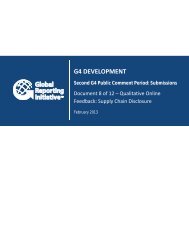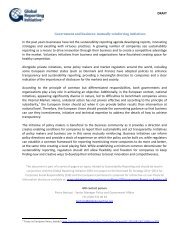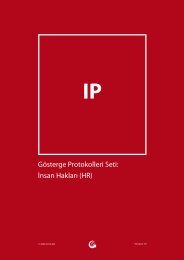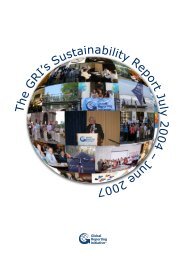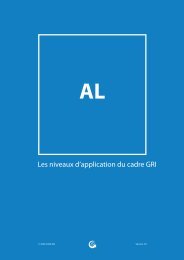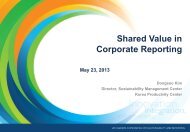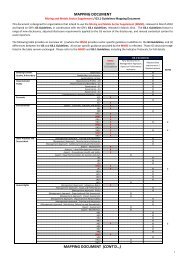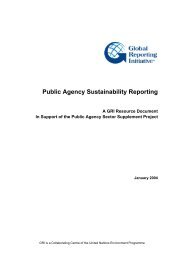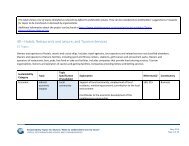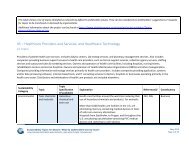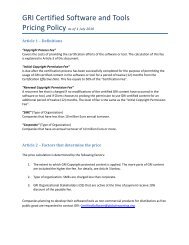G3.1 Sustainability Reporting Guidelines - Global Reporting Initiative
G3.1 Sustainability Reporting Guidelines - Global Reporting Initiative
G3.1 Sustainability Reporting Guidelines - Global Reporting Initiative
Create successful ePaper yourself
Turn your PDF publications into a flip-book with our unique Google optimized e-Paper software.
<strong>Sustainability</strong> <strong>Reporting</strong> <strong>Guidelines</strong><br />
RG<br />
may change at a slower pace. Regardless of the strategy<br />
used, the full set of applicable information for the<br />
reporting period should be accessible in a single location<br />
(either a paper or web-based document).<br />
Assurance<br />
Choices on assurance<br />
Organizations use a variety of approaches to enhance<br />
the credibility of their reports. Organizations may have<br />
systems of internal controls in place, including internal<br />
audit functions, as part of their processes for managing<br />
and reporting information. These internal systems are<br />
important to the overall integrity and credibility of a report.<br />
However, GRI recommends the use of external assurance for<br />
sustainability reports in addition to any internal resources.<br />
A variety of approaches are currently used by report<br />
preparers to implement external assurance, including<br />
the use of professional assurance providers, stakeholder<br />
panels, and other external groups or individuals.<br />
However, regardless of the specific approach, it should be<br />
conducted by competent groups or individuals external<br />
to the organization. These engagements may employ<br />
groups or individuals that follow professional standards<br />
for assurance, or they may involve approaches that follow<br />
systematic, documented, and evidence-based processes<br />
but are not governed by a specific standard.<br />
• Utilizes groups or individuals to conduct the<br />
assurance who are not unduly limited by<br />
their relationship with the organization or its<br />
stakeholders to reach and publish an independent<br />
and impartial conclusion on the report;<br />
• Assesses the extent to which the report preparer<br />
has applied the GRI <strong>Reporting</strong> Framework<br />
(including the <strong>Reporting</strong> Principles) in the course<br />
of reaching its conclusions; and<br />
• Results in an opinion or set of conclusions that is<br />
publicly available in written form, and a statement<br />
from the assurance provider on their relationship<br />
to the report preparer.<br />
As indicated in Profile Disclosure 3.13, organizations<br />
should disclose information on their approach to<br />
external assurance.<br />
GRI uses the term ‘external assurance’ to refer to activities<br />
designed to result in published conclusions on the quality<br />
of the report and the information contained within it. This<br />
includes, but is not limited to, consideration of underlying<br />
processes for preparing this information. This is different<br />
from activities designed to assess or validate the quality<br />
or level of performance of an organization, such as issuing<br />
performance certifications or compliance assessments.<br />
Overall, the key qualities for external assurance of<br />
reports using the GRI <strong>Reporting</strong> Framework are that it:<br />
• Is conducted by groups or individuals external to<br />
the organization who are demonstrably competent<br />
in both the subject matter and assurance practices;<br />
• Is implemented in a manner that is systematic,<br />
documented, evidence-based, and characterized<br />
by defined procedures;<br />
• Assesses whether the report provides a reasonable<br />
and balanced presentation of performance, taking<br />
into consideration the veracity of data in a report<br />
as well as the overall selection of content;<br />
Version 3.1<br />
41





